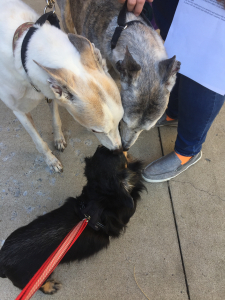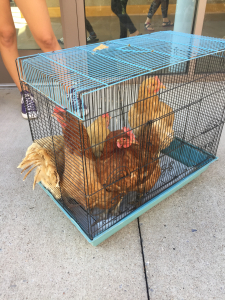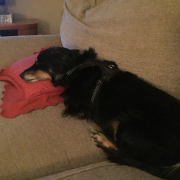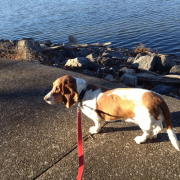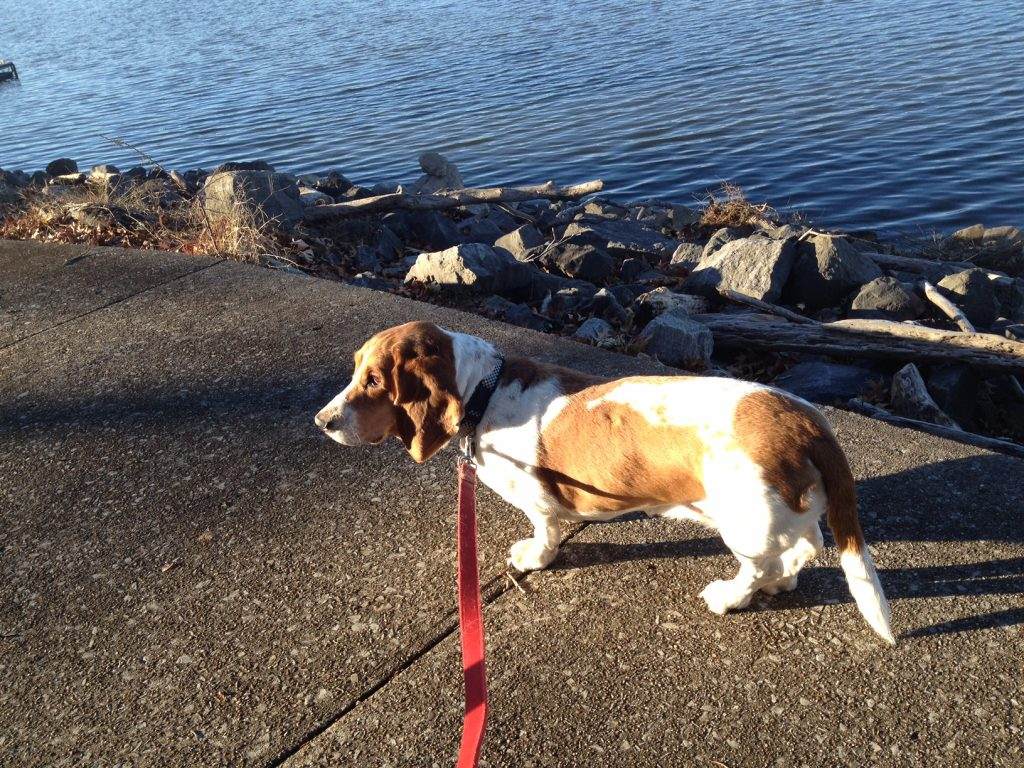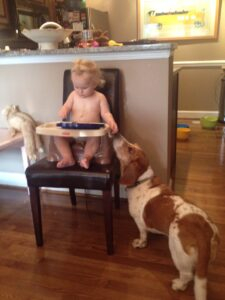There’s a little black dog curled up with his head under my chair as I sit here typing. He has shaggy, spiky-haired ears that make him look like Gandalf suffering from bedhead. There are fluffy, long tufts of hair between his large front toes, furthering the wizardly image. When furrowed, which is often, his ginger-colored eyebrows create a facial expression of intense scrutiny and concentration. Usually when I look down, he’s watching me (can he hear my head turn?) and those eyebrows telegraph a lot of questions.
I’m not sure how he got here. No, that’s not quite right. The brain knows the facts, dates, and details about it, but my heart is still puzzled about the whole thing.
When your dog dies, people quickly ask, “Are you going to get another one?” I had been pondering this myself for some time, long before my ailing 13-year-old Basset Hound fell victim to cancer just about eight weeks ago. She had been declining for more than a year, so I had lots of time to consider it. I decided, and even said to a few people, that it was time for me to take a break from dog ownership. I’m gone all day, there’s travel occasionally, it’s tough to always find dog accommodations. Then there’s the constant wallet punch, as veterinary expenses continue to skyrocket. Maybe later in life, after retirement from a regular office schedule—that’s what I said. And some part of me believed it.
Yet, here is Gandalf the Frowner dozing quietly, hairy toes curled contentedly under his chest as he recharges his batteries from a fierce game of fetch. GTF, whose real name is Gus, puts roughly 500-percent effort into everything the universe brings. Then the balance of nature requires the restorative nap.
I honestly can’t remember when I began to realize how deeply lonely I would be without a dog. The timetable is fuzzy, but some time over the summer, as my old pal got slower and sadder and sicker, I began looking at breed rescue sites and a couple of shelters that are well-run, just to watch what was happening and acquaint myself with the process. I put in a couple of queries on dogs with irresistible photos, but all had been claimed. That was just fine.
Then the Big Bang happened. Within a matter of less than four weeks in late summer, my old girl was diagnosed as terminally ill, she died, and Gus came here to live. That sounds as though he showed up at the door, rang the bell, and demanded entry, and of course he didn’t; he’s way too short to reach the doorbell. He appeared on a website for rescued Dachshunds in Tennessee, I put in an application, was approved, and drove a couple of counties over to bring him home. The whole process was strangely surreal and watching myself do it almost an out-of-body experience. Though a deeply Christian person, I don’t put much credence in the concept of being “led” to do something. Yet wherever the pilot resided, there was another power somewhere driving me to connect with this dog.
If that weren’t strange enough, Gus is in many ways–nearly all ways, come to think of it–the dog I never wanted before. Let’s start with size. Raised with big dogs, I was fooled into thinking that small dogs are dumb and yippy. Gus is a long-haired, standard Dachshund, a sturdy and muscular 20 pounds, twice as large as the most-common wiener dogs. That’s still small to me. Moreover, his energy level sparked a shocking adjustment; Bassets are soul relaxants in canine form, ever-mellow, relaxed, and universally happy to live and let live. Dachshunds are intense little thinkers, bustling problem-solvers who move everywhere at a rapid clip, miss nothing, and insist on explanations for the unidentified. Apparently, they are also astute listeners. Two nights ago I said, more rhetorically than anything, “I wonder where your ball is, Gussie?” He stared at me briefly (translation chip processing, perhaps?), then trotted off out of sight to another room and returned with it.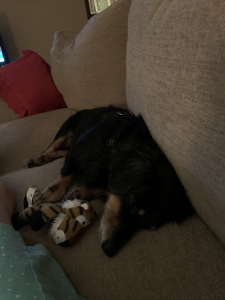
Ask a Basset such a question, and the return is likely a look that indicates, “Beats me. If you find it, have fun. (Yawn.)”
As anyone who has ever rescued an animal will tell you, you must prepare to work with whatever you agree to take on. With Gus, it’s been surprisingly easy. Estimated to be about three years old, he arrived fully house-trained, very sociable with adults, children and other dogs, and game to achieve detente with a dominant and opinionated cat. He doesn’t chew or beg. His adjustment to routines of the household and the new days of his life was—rather like his dancing little gait—fast, efficient and precise.
Yet stashed somewhere among the new dog beds and lighter leashes and different treats there is a tiny hoard of guilt that lingers. It’s too soon for me to return in equal measure the grateful adoration he works so hard to express. The adjustment that has not yet arrived is the one deep in the heart, where the pain of losing my long-eared friend and housemate of 13 years stubbornly remains. The other day I heard a deep bark and thought for a split second it was her. I need to take the unopened cans of food she never ate to one of the shelters and clear space in the cabinet, but I can’t make myself pick them up. I have been forced to realize, all predictions to the contrary, that this little guy who fetches like a demon and burrows deep next to me on the couch is not the wizard (however Gandalf-like) who can wand that grief away. It is wonderful that he is here, but healing and surrendering the heart again is a different matter, something on a different plane, with its own timetable.
“How’s he doing?” the neighbors ask when we are all out walking the dogs, and I respond, brightly, “Great!” Because it’s true. They don’t ask how I am doing, thank goodness, because some days the answer would be uncertain. Grief is the most unpredictable of all companions. All that can be done is to walk on through the days (or, rather trot on, lest I get left behind) and apply faith to the forward motion.
On the first Saturday in October, our church honors the traditional Feast of St. Francis with an annual Blessing of the Animals. Gussie and I made our way carefully through the mixed crowd of small and gigantic (at least, to him) dogs and stepped around a crate of lovely red hens. The service is a favorite rite of fall for me, and last year, my old hound dog received the blessing. We stood in the cool sunshine in a circle, people and their animal friends, and as we bowed our heads for the opening prayer, I looked down at the little face looking up with a gaze of utter focus, those ginger eyebrows knit in concentration. Tears sprang suddenly out and down, big fat ones like the first drops that smack the windshield to herald an unexpected summer storm, as the pastor began to read out the Saint’s familiar words:
“Lord, make me an instrument of Your peace;
Where there is hatred, let me sow love;
Where there is injury, pardon;
Where there is doubt, faith;
Where there is despair, hope;
Where there is darkness, light;
And where there is sadness, joy.”
